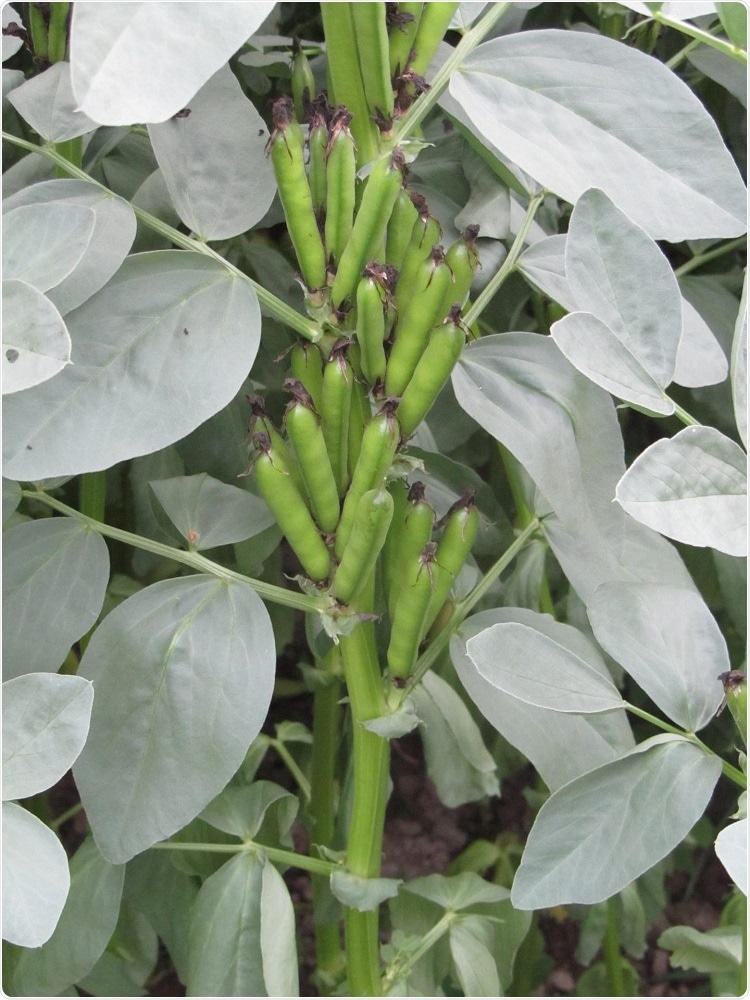Faba beans are exceptional sources of food protein; however, around 4 % of the world’s population is affected by favism, making them sensitive to the faba bean anti-nutrients vicine and convicine.

Researchers have identified the VC1 gene as responsible for the production of anti-nutrients vicine and convicine that make people sensitive to the faba bean. Image Credit: Frederick Stoddard, University of Helsinki.
Recently a team of international researchers identified that the VC1 gene is responsible for the production of these anti-nutrients. Faba beans were a source of food protein during pre-historic times; however, a part of the population, mainly from the warm southern regions, could not tolerate them.
Pythagoras and his followers shunned the beans, and Roman priests of Jupiter linked them with death. Currently, it is known that faba beans synthesize the anti-nutrients vicine and convicine, which leads to a risk of favism—a condition caused by red blood cell damage—for vulnerable individuals.
Faba beans are the second-highest in yield globally among the legumes, which are the pod-producing family of plants to which pea, soybean, and chickpea belong. They also have the highest seed protein content among all starch-containing legumes and out-grow soybean in cool weather.
Faba beans are a prime source of protein in enabling a global transformation to a plant-based diet and are considered important for considerable reductions in carbon emissions.
The VC1 gene is responsible for vicine-convicine content
When people lacking a certain enzyme consume larger portions of uncooked faba beans, vicine and convicine cause the abnormal breakdown of red blood cells. The resultant hemolytic anemia, called favism, has undoubtedly restricted the potential use of faba beans. There are numerous varieties of faba beans with low levels of vicine and convicine, but the gene responsible for this trait was not known previously.
Researchers have now identified the gene responsible for vicine-convicine content. They also identified the particular mutation within this gene that leads to the reduction in synthesis.
The researchers discovered that all faba bean varieties featuring low vicine-convicine content, evolved from a single accession found in a genebank, had two nucleotides—the “letters” constituting DNA—inserted within the VC1 gene. This insertion hinders the function of VC1 and is the solely known genetic source of low vicine and convicine content.
Working across disciplines to integrate biochemical and molecular genetic data was key to finally unveiling the genetic source of low vicine and convicine.”
Stig U. Andersen, Department of Molecular Biology and Genetics, Aarhus University
The research findings have been published in the Nature Plants journal and could help describe the biosynthetic pathway of vicine and convicine, and eventually applied for breeding, production, and commercial use of faba bean varieties that are completely free from the anti-nutritional compounds.
The research group, which includes leading scientists from Finland, Denmark, Germany, Canada, and the United Kingdom, is already looking ahead.
Now that we understand where these anti-nutrients come from, we can attempt to breed them out completely, thus contributing to food safety and sustainability.”
Fernando Geu-Flores, Section for Plant Biochemistry and Copenhagen Plant Science Centre, Department of Plant and Environmental Sciences, University of Copenhagen
Source:
Journal reference:
Björnsdotter, E., et al., (2021) VC1 catalyses a key step in the biosynthesis of vicine in faba bean. Nature Plants. doi.org/10.1038/s41477-021-00950-w.